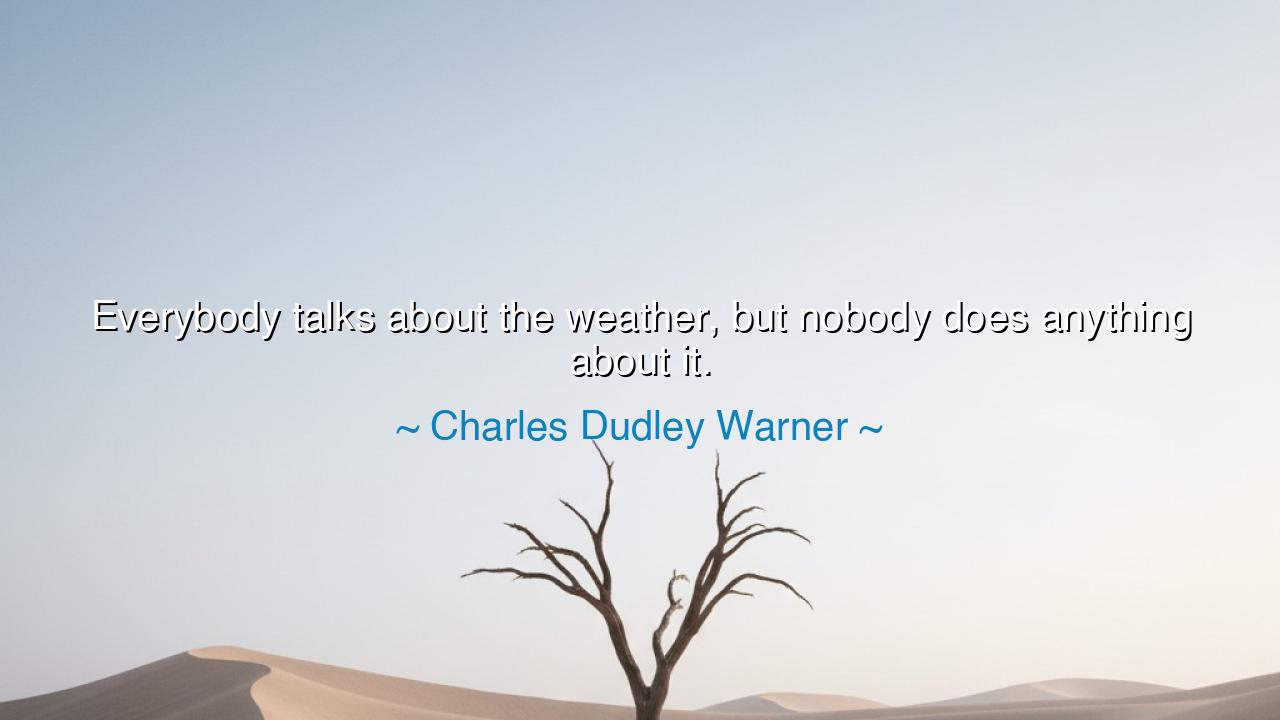
Everybody talks about the weather, but nobody does anything about






"Everybody talks about the weather, but nobody does anything about it." – Charles Dudley Warner
In the great span of human history, we find that the world we live in is often shaped by the forces of nature, and yet, despite our conversations, our efforts to control those forces often seem feeble. The words of Charles Dudley Warner are a poignant reminder of humanity’s paradox: while we spend much of our time discussing the world around us, we rarely take action to change the things that seem beyond our control. The weather, that ever-present force of nature, governs our daily lives, shaping the seasons, the crops, and even the very mood of the people. But despite our constant chatter about it—our hopes, our frustrations, our forecasts—there is little we can do to alter it.
The ancients, who had no access to the advanced technology we possess today, understood deeply the power of nature. They lived in harmony with it, as much as they could, and they sought to understand it through myths, rituals, and the early observations of the stars and the sky. The Greeks personified the forces of nature through gods like Zeus, who controlled the thunder, and Poseidon, who ruled the seas. Yet, even with their reverence for these mighty forces, the ancients never sought to dominate the weather. Instead, they understood that to survive, they must adapt to the rhythm of the seasons, the cycles of nature, and the whims of the gods. Warner’s reflection captures this ancient truth—that while we can observe and discuss nature, we are often powerless to change it.
Consider the story of Cincinnatus, the Roman farmer turned statesman, who was called upon in a time of crisis to lead his people. When the threat to Rome had been vanquished, he returned to his fields, a humble man who sought no further glory. He knew that his power and influence were temporary, just as the weather is ever-changing. Cincinnatus did not seek to control or manipulate the forces around him, but rather he understood that his role was to adapt and act when necessary. This humility before nature and the impermanence of power is a central theme in many of the stories from ancient times. The weather, like power, is fleeting and beyond our control, and thus, our wisdom lies in how we respond to it rather than how we try to dominate it.
The Industrial Revolution, though not ancient, echoes a similar theme. The age of machines sought to master nature, with steam engines, factories, and great innovations transforming the landscape. But even as we gained the ability to manipulate nature through technology, the weather continued to elude our control. We learned to shape our environment with machines, but we could not bend the storm to our will. This quest to control the natural world mirrors Warner’s idea that discussion is easy, but true action—action that seeks to change the fundamental forces of nature—is often out of reach. Despite all our technological prowess, the weather remains a reminder that some things will always be beyond our grasp.
The key lesson in Warner’s words is not about resignation to the uncontrollable, but about accepting our role in the face of it. We are not meant to fight the weather or the storms of life, but to understand them and adapt to them. The weather, as metaphor, speaks to the great challenges we face in life—those things that we cannot predict, control, or manipulate. Whether in business, personal relationships, or the world stage, there will always be forces beyond our ability to control. The true wisdom lies in how we respond—not by fighting against the storm but by learning to move with it, to adjust our sails when the winds change.
In our own time, global challenges such as climate change illustrate the broader implications of Warner’s insight. The weather, in all its forms, has grown more unpredictable, and discussions about it are widespread, from scientific reports to political debates. Yet, despite this constant discourse, action on a global scale remains insufficient, and the challenges posed by our changing climate loom ever larger. As individuals, we may not have the power to stop the weather, but we do have the ability to adapt and take responsibility for the impact we have on the planet. Warner’s quote urges us to acknowledge the limitations of our control, but it also calls us to action—not to sit idly by and complain, but to engage in the solutions that lie within our reach.
Let us then live with the awareness that while we cannot control the weather, we have the power to shape how we respond to the storms of life. Like the ancients, who did not try to tame nature but worked in harmony with it, we must adapt and embrace the natural rhythms of existence. Warner’s insight calls us to move beyond idle chatter, to take action where we can, and to understand that the forces of nature—whether literal or metaphorical—will always test us, but it is through adaptation and resilience that we find our strength. The true power is not in changing the weather, but in how we navigate through the storm.






AAdministratorAdministrator
Welcome, honored guests. Please leave a comment, we will respond soon